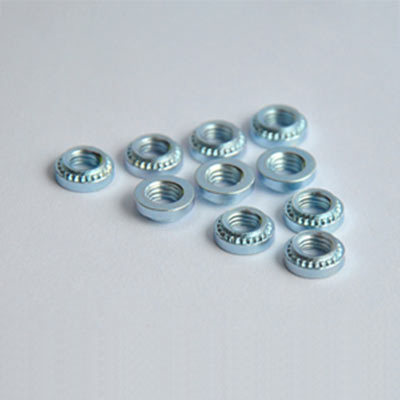Carbon steel Self-clinching Nuts are high-strength fasteners designed for thin metal sheet applications. Their self-locking embedded structure allows them to excel in fastening, vibration resistance, and tensile strength. To ensure the quality and durability of these fasteners, engineers conduct rigorous torque and tensile strength testing. These tests are critical indicators of their long-term stability and reliability in high-stress environments, ensuring the fasteners' safety and performance in real-world applications.

Importance of Torque Testing
Torque testing is a key step in evaluating the anti-loosening capabilities of Carbon Steel Self-Clinching Nuts. Since the installation process involves embedding the nut into the metal surface to create a self-locking mechanism, torque testing ensures that the fastener does not loosen due to vibration or repeated loads during normal use. The test simulates the torque load these nuts will experience in actual applications to ensure their self-locking effect remains consistent.
Testing Process
Torque testing typically includes two aspects: installation torque and removal torque. Installation torque refers to the minimum torque required to install the nut, while removal torque refers to the force needed to loosen the nut from the hole. These parameters help ensure that the connection remains stable during both installation and removal, without over-tightening or damaging the fastener.
Test Results and Performance
Carbon Steel Self-Clinching Nuts generally perform better than traditional nuts in torque testing. The self-locking structure formed by embedding the nut into the metal sheet ensures that it will not slip or loosen during use. Even in high-vibration environments, the removal torque remains stable, ensuring the long-term reliability of the connection.
Role of Tensile Strength Testing
Tensile strength testing is designed to evaluate the load-bearing capacity of self-clinching nuts under high tensile conditions. Since self-clinching nuts are intended to form a strong connection in thin metal sheets, the results of tensile testing determine whether the fastener can withstand specific tensile forces without loosening or breaking.
Testing Methods
Tensile strength testing is typically performed using specialized testing equipment that gradually applies tensile force until the nut deforms or loses its fastening effect. This process can include both destructive and non-destructive testing to assess the nut's performance under various stress conditions.
Test Performance and Results
In tensile strength tests, Carbon Steel Self-Clinching Nuts demonstrate excellent strength and durability. The materials and design of these nuts allow them to withstand high tensile forces without loosening or breaking. The test results show that, even in extreme stress conditions, the nuts maintain superior tensile strength, providing strong assurances for their application in high-load environments.
Material and Surface Treatment for Enhanced Stability
The carbon steel used in self-clinching nuts offers exceptional fatigue resistance. Combined with a zinc plating treatment, these fasteners exhibit strong anti-corrosion properties, ensuring long-term performance even in harsh or high-stress environments. This combination not only extends the service life of the fasteners but also provides additional stability under frequent use.
Structural Design for Vibration Resistance
The self-locking design of the nut helps prevent loosening in high-stress and high-vibration conditions, making it ideal for applications where stability is crucial. The nut’s embedded design in the metal sheet ensures that it remains firmly in place, even under heavy or repeated loads. This performance makes it especially suitable for industries such as automotive, aerospace, and heavy machinery where vibration and load-bearing capacity are key factors.
Performance in Real-World Applications
Carbon steel self-clinching nuts are widely used in electronics, automotive, appliances, and industrial manufacturing, demonstrating excellent long-term stability and reliability. Feedback from users in industries such as automotive chassis, electronic device enclosures, and heavy machinery indicates that these nuts maintain excellent fastening performance, reducing maintenance and replacement costs.
The torque and tensile strength test results of carbon steel self-clinching nuts highlight their superior performance under high-stress conditions. The high-strength material, zinc plating, and innovative self-locking design ensure that these fasteners not only meet industrial standards but also excel in high-load applications requiring long-term stability. Through rigorous testing, carbon steel self-clinching nuts provide an efficient and reliable fastening solution, ensuring long-lasting safety and stability across a wide range of applications.